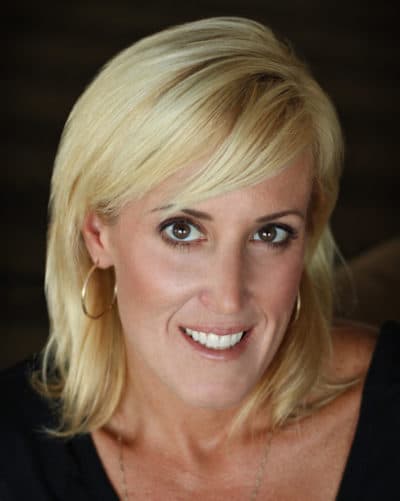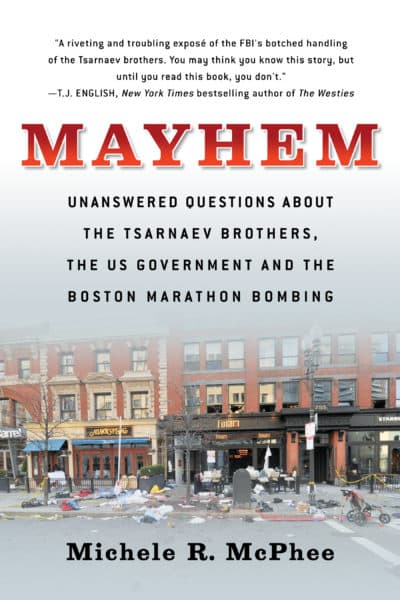Advertisement
In Latest Book, Michele McPhee Investigates 'Mayhem' Surrounding The Boston Marathon Bombing
It was early afternoon, a cool, sunny spring day exactly seven years ago, on April 15, 2013. Michele McPhee was walking toward Copley Square, on her way to meet a friend on Boylston street and watch the last leg of the Boston Marathon. McPhee was a crime reporter living in East Boston — she’d worked for the Globe and Herald, had been the New York Daily News police bureau chief and was now working for ABC-TV and Newsweek — but she was off that day and at the marathon just for fun.
All that changed in a few seconds.
“I got a text from a NYPD cop, ‘Are you okay?’” McPhee recalls, wondering what might be up. “Then, the sirens. And the chaos.
“A source let me into the secure scene and all I can remember thinking was, ‘This looks so much worse than 9/11.’ After 9/11, there was no blood, no bodies, just the jumpers. The victims there were extinguished when the towers collapsed,” McPhee says in an email. “In contrast, Boston looked like Baghdad. Puzzle pieces of body parts all over the street. Victims screaming. People running to random vehicles with victims. Backpacks discarded. Those metallic capes blowing all over the place.”

McPhee didn’t know it then, of course, but after the horror, her search for the truth about the Boston Marathon bombings would begin. She did extensive reporting for ABC and Newsweek following the bombing. She covered the manhunt for Dzhokhar and Tamerlan Tsarnaev, the assassination of MIT policeman Sean Collier, the Watertown shootout in which Tamerlan was run over by his brother; and Dzhokhar’s capture after another shootout, trapped as he sheltered in a boat in a resident’s backyard. Then came his trial, conviction and death sentence.
McPhee recalls Dzhokhar at the trial as “such an unrepentant little twit, smirking at the victims as they took the stand. He was inhuman. He had no remorse. Even when he stood and made that fake tearful speech, nobody was moved by that. Let him rot in that Supermax [in Florence, Colorado] for the rest of his miserable life and stop costing the taxpayers millions upon millions of dollars to try and save his life every time his appeal comes up.”
Her first book about the case, “Maximum Harm,” was published in 2017. (It’s in development as a documentary with the Oscar-winning director of “Inside Job,” Charles Ferguson, at the helm.) A revised and updated first paperback version, “Mayhem: Unanswered Questions About the Tsarnaev Brothers, the US Government and the Boston Marathon Bombing,” is out now. It’s her seventh true-crime book. (The launch party McPhee was planning on hosting April 13 at Almo Gaucho in South Boston was canceled because of the coronavirus pandemic.)
Advertisement
McPhee’s investigation churned up a plethora of crossed connections and darkened alleyways — what she calls so many “compiling coincidences. There’s so much information to keep track of. With all the charts and maps, my house looked like Carrie Mathison’s from ‘Homeland.’”
Some of the troubling issues she explores in the updated version: Did the Tsarnaevs really build the bombs themselves or did they have allies that aided and abetted them? The government has said in court records and trial testimony that the Tsarnaev brothers did not build the bombs they detonated. What about the questionable handling of that case by the various law enforcement agencies? Why was a triple murder in Waltham that Tamerlan allegedly committed in 2011 not pursued? McPhee covered some of that turf in “Maximum Harm,” and expanded upon it with “Mayhem.”
“It all sounds crazy, like you need a tin foil hat, but you can see all this stuff is annotated [in the book],” McPhee says. “This isn’t stuff I made up or is theory or blog conspiracy. There is nothing I can’t prove. If you come away from the book thinking there’s a lot more to the marathon bombing story than we’ve been told, that’s my goal.”
McPhee says what she’s done is pose questions that could, or should, lead to authorities opening doors.
“What I’d like people to do is ask the same questions I’m asking,” she says, on the phone from her home in Los Angeles. “For example, if the brothers didn’t build the bombs, who did? That’s the biggest question we have and I think the answer to that lies with Daniel Morley. And why did the FBI leap into that investigation?”
McPhee lays out the situation: “Morley was a young man from Topsfield. Fifty-five days after the Boston Marathon, he attacked his mother, who he was living with, and his mother’s companion. They crawled out of a window to escape his rampage. The police come, there’s a long standoff. Finally, they get Daniel Morley to surrender and get him in an ambulance to be evaluated mentally.
“The mother tells a Topsfield police sergeant ‘My son was friends with Tamerlan and he told me he’s done something he’s going to answer to God for.’ Of course, the cops were alarmed and they asked for permission to search his room and what’s found in that room? Practically every component to the Boston Marathon bombs. Those green circuit boards, the BBs, the empty box top to a six-quart Fagor pressure cooker, which is the exact size and brand used [in the bombings] and are hard to find. They only sell them at Macy’s.”
McPhee says she believes Tamerlan “had a relationship with various federal agencies before the Boston Marathon attack, but it’s too complicated to point the finger at any one entity.” She writes that the FBI recruited Tamerlan as an operative in 2010, ironically enough in an attempt to thwart Islamic terrorist plots, before he became radicalized.

The Waltham killings were a huge red flag. McPhee says her latest book has “a lot of new information about the Waltham triple murder. I think the crux of it for [local] law enforcement was they were convinced there was a lot more to the story, that the FBI knew a lot more about the brothers. It seemed incredibly inexplicable that nobody questioned Tamerlan as a suspect. Whether you believe Tamerlan was an asset or not, and I believe he was, there’s just so much that’s unanswered to this day and it’s perplexing that no one seems to care.”
McPhee, who just turned 50, currently writes for Newsweek and one of her stories for the magazine on the FBI informant who infiltrated MS-13 is in development for a scripted series on HBO with a working title “The Beast.” It’s based on her upcoming 2021 book, “Operation Mean Streets.” Like David Simon (“The Wire,” “The Plot Against America”), McPhee wants to shift, in part, from crime journalism into writing for film and television. She scripted an episode of Showtime’s “City on a Hill” during its first season and is a consultant on season two.
McPhee has long been a queen of source cultivation, going back to when she covered the four infamous drug-related killings at the 99 Restaurant in Charlestown in 1995. She was then just a Globe co-op student, but was sent out to the site because she knew the turf.
“When the marathon bombing hit, I knew a lot of the cops that responded, the Tewksbury Police Department, State Police and the NEMLEC SWAT Team that responded to the boat,” McPhee says. “A lot of the reporting came from the Office of Inspector General report, the Mass. Emergency Management Agency report, letters to the FBI from Congressman William Keating and others, Tamerlan's heavily redacted A-file, which was his immigration file. There is not one fact in that book that is not backed up by police reports, trial testimony, interviews and court documents.
“Conspiracy theories are not based in physical evidence. I have evidence of everything in my book. I have been cataloguing this information for six years. No one has debunked a single fact — not in any of my reporting for Newsweek or Boston Magazine.”
Asked whether she anticipates any blowback from any of the federal agencies she cites in “Mayhem,” McPhee says, “I think what you’re going to get is radio silence. Or the patented ‘We cannot confirm nor deny.’ But you can’t kill that message.”
“What I really hope,” she adds, “is that somebody does a larger investigation, not to assuage my ego or back me up or validate my reporting. But it’s going to happen again and again and again if we don’t demand answers from the FBI. I think we as a society have to uncover the real truth of these issues so they don’t keep happening.”
